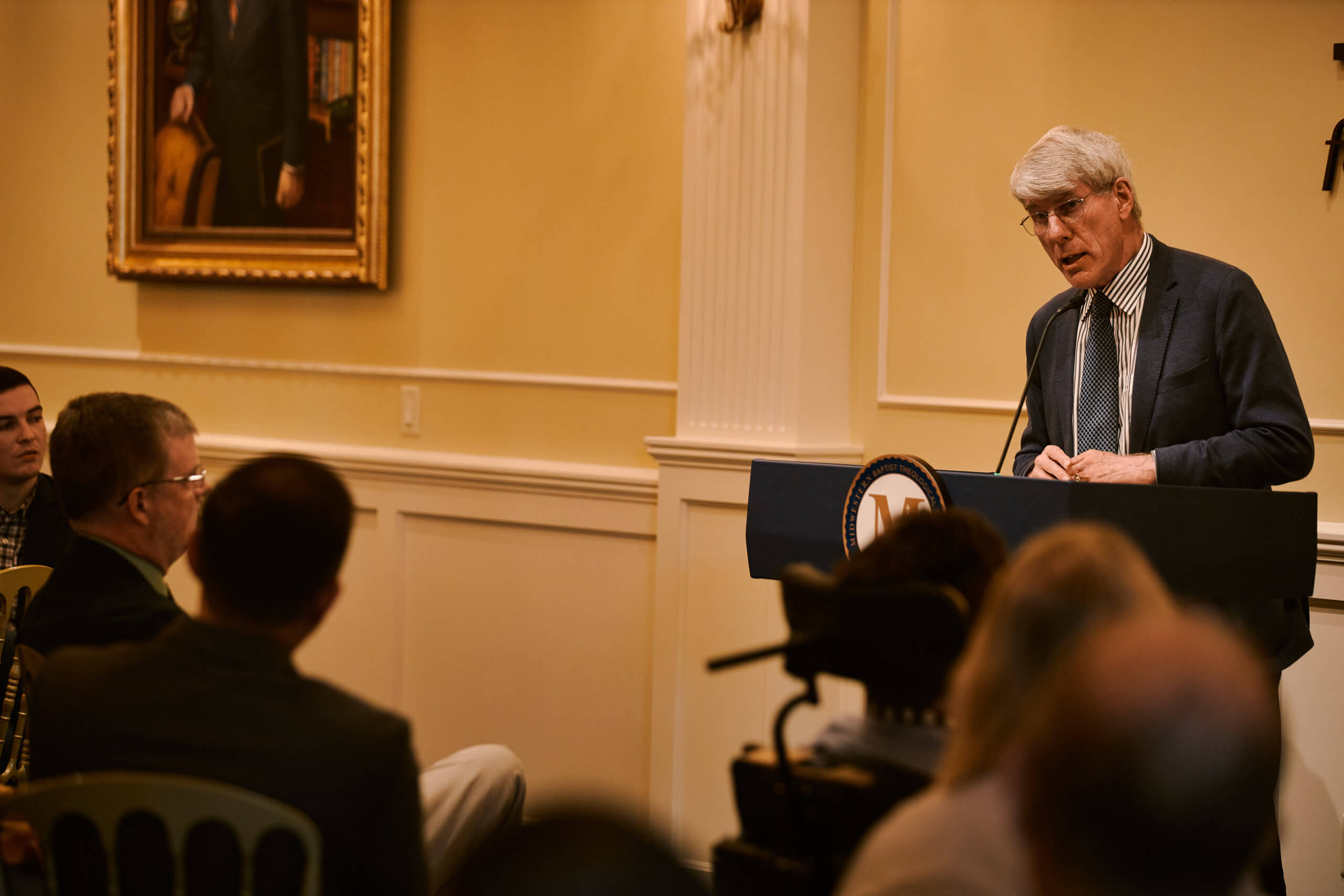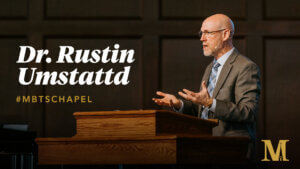KANSAS CITY, Mo – Midwestern Seminary hosted historian David Bebbington for a luncheon and lecture on Friday, September 9.
Bebbington, who is well-known for his evangelical quadrilateral, focused his lecture on the topic, “Evangelical Preaching in North America in the Late Twentieth Century.”
“It was a great joy to host Dr. David Bebbington on campus recently,” said President of Midwestern Seminary and Spurgeon College Jason Allen. “Dr. Bebbington is a renown historian, and I am always grateful to have guests like him on campus from whom our students can learn.”
Throughout his life, Bebbington has compiled detailed notes on religious services across the world. While most of these services are from Britain, he kept extensive notes on North American services after he began visiting North America in the late 1980’s.
Bebbington’s notebooks include a variety of details from services – not just the sermons, but the patterns of service, choice of hymns, habits of communion, prayers, or even, as he noted, “funny hats and strange heresies.”
He also shared, “Although far from representative of all of North America, my notes reflect what I regard as a fair and authentic representation of North American evangelical preaching.”
Throughout his lecture, Bebbington shared several similarities between services in North American congregations, highlighting how the services reflected the evangelical beliefs of each local church.
Despite the wide variety of denominations and convictions represented in his sampling, he said of these services, “Evangelical Christians share a special emphasis on the Bible, the cross, conversion, and activism.”
First, he recognized the priority of the Bible.
In the services he attended, Bebbington noted the many ways biblical priorities were revealed, whether through sermons titled, “Can the Bible make a difference?”, sermons warning against misinterpreting Scripture, or even a third sermon preached on the power of the Word of God.
In each of these, he stated, “The emphasis on the Bible was clear throughout the sample.”
Second, he mentioned the common theme of the cross.
“Preachers would refer to what Christ did on the cross without any further explanation needed for congregational understanding,” he said.
“Some services detailed the cross more than others, but the emphasis on the cross in these congregations signified their evangelical convictions.”
Third, Bebbington highlighted the evangelical theme of conversion that was present throughout the services he attended.
“Preachers would challenge attendees to receive new life, repent and be baptized, make use of prayer counselors, and give their lives to Christ.”
“Conversion in both theory and practice was a marked feature of the sample,” Bebbington said.
Finally, the evangelical theme of activism was present in the sampling, yet it was not as prominent as the other three themes of evangelical preaching.
Whether it be an emphasis to “get up and go” or “support a local ministry,” there was a clear emphasis on activism that binds the congregation to evangelical convictions.
After explaining each congregation’s evangelical emphases, Bebbington also addressed the basic characteristics of the services he attended. He noted the settings, the preachers, the audiences, and the themes of each of the services.
Bebbington also explained the specifics of each service – such as the location of the pulpit, length of sermon, dress of preacher, and more – and how each signified a wide variety of convictions throughout the sampling.
He noted the preacher’s rhetoric, use of illustrations, and citations. As an example, he shared, “The content of the sermons displayed a distinct tendency to polarization, whether focusing on doctrinal preaching or a growing therapeutic nature of the sermons.”
Bebbington concluded his lecture by addressing three “exotic examples” from his sample to highlight how evangelicalism can truly contain a wide variety of practices and convictions.
These three examples included on Reformed Baptist congregation, Willow Creek Community Church, and a church in the Vineyard Movement.
Despite their clear differences, which Bebbington made sure to draw out, he shared his belief that each congregation falls under the umbrella of evangelicalism.
“Emphasis on each of the four elements of the quadrilateral – the Bible, cross, conversion, and activism – were present in each congregation,” he stated.
Finally, Bebbington brought together all his observations to make a concluding remark.
“Perhaps through this diversity,” Bebbington said, “as expressed by Paul in his letter to the Ephesians, ‘through the Church, the manifold wisdom of God was made known.’ In the sample I attended, it was manifold, but it was also the wisdom of God.”
Immediately following the lecture, attendees were able to ask questions regarding Bebbington’s topic.
These questions focused on application of the evangelical quadrilateral, the state of evangelicalism today, how to best assess whether a congregation is truly evangelical, and more.
In all these responses, Bebbington carefully and winsomely referred back to the evangelical quadrilateral as a continued source of help in the midst of cultural confusion and evangelicalism today.
David Bebbington currently serves as Emeritus Professor of History at the University of Stirling in Scotland, Distinguished Visiting Professor of History at Baylor University, and Fellow of the Royal Society of Edinburgh and the Royal Historical Society.
To see more of Bebbington’s published works, visit here.


